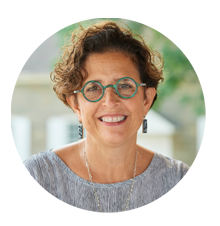 In March of 2000, I was in Washington, D.C. and overheard a colleague speaking about a Buddhist psychologist named Tara Brach who would be speaking that evening at an after-dinner event. Instantly hooked by the Buddhist-psychologist combo, I decided to attend. Within minutes, I was mesmerized by this small, soft-spoken, gentle woman whose quiet, melodic voice and light green compassionate eyes immediately sent me into a highly relaxed state. In her talk on radical acceptance, she spoke about the idea of moving towards what upsets us rather than moving away from it (with the use of denial, distraction, or otherwise). In fact, she recommended a most revolutionary idea which came to her as she was speaking to us (talk about being present in the moment and how creativity springs forth). Dr. Brach instructed us: “Invite your fear to tea.” I have practiced this approach and have taught this to so many patients over the years and it is a game changer! You may wonder, How can I apply this to our current situation? The script can sound something like: “Hello, Coronavirus, would you like to come to my porch and discuss some items over tea? Perhaps we can chat about what’s been going on in the world. Where you are going with this, because I am scared, disoriented, sad, and weary and after all, I do have a life to get back to.o, scratch that, reset...I have to accept you are here and that I need to make some adjustments and changes in my life, so that I can then see a new way forward with possibilities that can ground me and center me back into life again.”
In March of 2000, I was in Washington, D.C. and overheard a colleague speaking about a Buddhist psychologist named Tara Brach who would be speaking that evening at an after-dinner event. Instantly hooked by the Buddhist-psychologist combo, I decided to attend. Within minutes, I was mesmerized by this small, soft-spoken, gentle woman whose quiet, melodic voice and light green compassionate eyes immediately sent me into a highly relaxed state. In her talk on radical acceptance, she spoke about the idea of moving towards what upsets us rather than moving away from it (with the use of denial, distraction, or otherwise). In fact, she recommended a most revolutionary idea which came to her as she was speaking to us (talk about being present in the moment and how creativity springs forth). Dr. Brach instructed us: “Invite your fear to tea.” I have practiced this approach and have taught this to so many patients over the years and it is a game changer! You may wonder, How can I apply this to our current situation? The script can sound something like: “Hello, Coronavirus, would you like to come to my porch and discuss some items over tea? Perhaps we can chat about what’s been going on in the world. Where you are going with this, because I am scared, disoriented, sad, and weary and after all, I do have a life to get back to.o, scratch that, reset...I have to accept you are here and that I need to make some adjustments and changes in my life, so that I can then see a new way forward with possibilities that can ground me and center me back into life again.”
In the face of crisis, the mind has a way of reacting that limits our perspective and intensifies our fears and pain. In these moments, we tend to either look back and drown in regrets or we suddenly have telepathic powers that primarily forecast worse-case scenarios. In the latter example, we are wiped out by tsunami-level thoughts that lead to, well, nowhere. Instead of drowning in the past or being wiped out into an illusory future, stay present in acceptance of what is, by saying to ourselves: “I accept the changes that come with the present reality. In fact, I say yes to this change.” This approach and position can help us feel more in control and less helpless. While we can’t stop what is changing, we can see it, speak to it, and practice the art of creating new possibilities, even in the most dire of situations. This means that I am willing to look at whatever arises, especially when it stirs sadness, disappointment, or loss in me.
The Coronavirus pandemic has single handedly brought our world to a screeching halt and in doing so, into a state of crisis that has given birth to fears of the unknown. Our life is changing, and that can make us feel out of control and helpless. Although we can't stop the cycles of change, we can learn to see change as a messenger-friend rather than a crippling-foe. When we listen to the messenger and welcome it, we are operating with presence and agency. This in turn allows us to practice the art of searching for and seeing possibilities in the most devastating situations. It also means we are willing to take a deep look into whatever arises, even if it is a sense of disappointment or loss. As the Sufi poet Rumi describes, "Every need brings in what's needed. Pain bears its cure like a child."
The practice of radical acceptance requires a letting go where change is accepted and not denied. Saying "Yes" to change is a form of radical acceptance, a deep allowing of thoughts, experiences, feelings and bodily sensations to be as they are and to allow them to move through you so that you don't become imprisoned in your fear and pain. Dr. Brach reminds us to place our hand over our heart where the fear and pain live and to say to ourselves, “I am afraid, I feel helpless and I am deeply grieving for what is no more.” She reminds us that the physical act of placing our hand on our heart is critical to coming to peace. “There’s a network of neurons in the heart area. When there is warmth and pressure on it, it is actually calming the sympathetic nervous system and reducing the fear centers in the brain.” In her book Radical Acceptance: Embracing Your Life With the Heart of a Buddha,” Dr. Brach also notes, “The boundary to what we can accept, is the boundary to our freedom.” I would add that it is also the path toward recalibrating and re-establishing stability into our lives. Balance, after all, has been noted and quoted to be the stability found at the center of acceptance.
Breathing practice of radical acceptance, place your hand on your heart:
Breathe IN: I accept the changes in my present moment
Breathe OUT: I release (the painful feeling you identify)
Breathe IN: I say Yes! to change
Breathe OUT: I release (the painful feeling you identify)
“The Guest House” A Poem by Rumi
This being human is a guest house.
Every morning a new arrival.
.A joy, a depression, a meanness,
some momentary awareness comes
As an unexpected visitor.
Welcome and entertain them all!
Even if they’re a crowd of sorrows,
who violently sweep your house
empty of its furniture,
still treat each guest honorably.
He may be clearing you out
for some new delight.
The dark thought, the shame, the malice,
meet them at the door laughing and invite them in.
Be grateful for whoever comes,
because each has been sent
as a guide from beyond.


